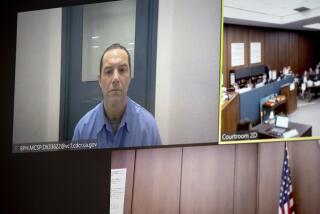Decision on Access to Jury Questionnaires Modified
- Share via
Fine-tuning a decision it issued last fall that emphasized the public’s right to know, a state appellate court said Tuesday that, with one exception, questionnaires increasingly used to pick juries in murder cases and in complex civil suits can’t be kept from the press.
However, the 4th District Court of Appeal said, certain forms can be kept secret--the questionnaires of potential jurors not actually called to the jury box to answer follow-up questions.
The ruling Tuesday, which stemmed from the murder trial last year of an Escondido woman, Roberta Pearce, was required to fall in line with a decision that had been issued later last year by another state Court of Appeal.
In a triple murder case from Contra Costa County, the 1st District Court of Appeal in San Francisco said the press had no right to see the questionnaires filled out by potential jurors who were not called to the jury box.
Those jurors were technically not yet part of the process of picking a jury, which traditionally has been open to the public and press, the 1st District said in its opinion, issued last Oct. 16.
That issue did not come up in the Pearce case. But the 4th District court said Tuesday it was obliged to go along with the San Francisco-based court.
The questionnaires have become popular in complex cases because of the wealth of information they provide lawyers about the background of jurors.
For instance, following the 4th District Court’s original opinion, issued last Sept. 11, a questionnaire was handed potential jurors in the murder trial last fall of La Jolla socialite Elisabeth Anne (Betty) Broderick. The press was allowed to read the completed forms.
Two key elements of the original 4th District decision remained unchanged.
In the September ruling, the first in California to expressly rule that the questionnaires have to be made public, the 4th District said that certain private information--such as a driver’s license number--remains secret.
It also said that jurors worried about the disclosure of embarrassing information can ask to have a closed-door hearing with a judge.
Judge William L. Todd Jr. wrote both of the 4th District Court opinions, with Judge Daniel J. Kremer concurring. Judge Gilbert Nares also concurred both times, but each time added a separate opinion saying that a notice to jurors that the questionnaires are public record should be in bold type at the beginning of the form.
Pearce was convicted of first-degree murder last March 12 in the death of her husband, Wayne Pearce. She was sentenced last May 11 to life in prison without parole by Vista Superior Court Judge Franklin Mitchell.
Mitchell had refused a request from the Copley Press, which publishes the San Diego Union and Tribune, to release the questionnaires in the Pearce case, sparking the original 4th District Court ruling.
There are six state Courts of Appeal, which handle appeals from the 58 Superior Courts.
More to Read
Sign up for Essential California
The most important California stories and recommendations in your inbox every morning.
You may occasionally receive promotional content from the Los Angeles Times.













